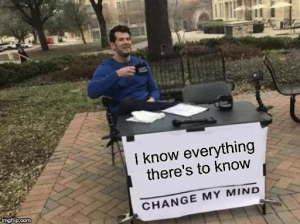 We all know those frustrating folks – yes, the ones in school who pretended to be know-it-alls and answered all the teacher’s questions, mostly incorrectly. Or as a manager, the team members who act shocked or surprised with any feedback they get.
We all know those frustrating folks – yes, the ones in school who pretended to be know-it-alls and answered all the teacher’s questions, mostly incorrectly. Or as a manager, the team members who act shocked or surprised with any feedback they get.
“But I’m great at this part of my job! How can you even say I didn’t do well this month on my process compliance”
The real life manifestation of the Dunning-Kruger effect can be really frustrating for managers.
What is the Dunning-Kruger Effect?
TL;DR- The Dunning-Kruger Effect is the tendency for people to vastly overestimate their abilities and be blissfully unaware of their deficiencies.
Here’s the longer version – The Dunning-Kruger Effect is a psychological phenomenon in which people with the lowest ability in a subject rate themselves as most competent, compared to others. Also, people with the least know-how on a topic also cannot recognize their own shortcomings. So they are really confident about their abilities and unable to fairly assess other people.
Want an example?
Theres a name for this The Dunning-Kruger Effect
⬇️⬇️⬇️⬇️⬇️⬇️⬇️⬇️⬇️⬇️https://t.co/xRCppSa4yr— Voting Blue Forever 🇺🇸 🇵🇷 🇭🇷 🇺🇦♑ (@CalameDiana) April 24, 2022
What causes the Dunning-Kruger Effect?
“The first rule of the Dunning-Kruger club is you don’t know you’re a member of the Dunning-Kruger club,” writes David Dunning. The truth is everyone is prone to this bias in some way or the other since we all have pockets of incompetence or lack of knowledge.
Studies have shown people overestimate their abilities on a range of tasks – from driving, to being ethical to having better grammar than most. We tend to judge ourselves to be better than others.
Why does this happen?
Scientists believe that poor performers lack the very expertise needed to see their own knowledge gaps. So the Dunning-Kruger effect isn’t the result of an over-inflated ego. It simply is a question of not knowing what it is they don’t know.
Dunning-Kruger Examples in Sales
Here are two examples of how the DK effect can manifest itself in sales teams.
- Star reps & process compliance – the best sales reps are 3 times less likely to comply with a process than the team. So a top sales rep would use the CRM only once the deal is closed. Leaders lose out on insights in their sales funnel. Managers often don’t push their star reps too much since they are bringing in the bacon. This hurts managers more than just annoying your stars to “follow the process!”
- Poor performing Reps who think they’re doing a great job – this is the opposite of point #1 above! Too often reps feel they’ve done a great job because they’re keeping old leads alive, and not focussing on closing them. Since their CRM is updated they feel they’re putting in the effort and the closing is because of some externality (competition, pricing, product features) etc. This hurts as you don’t get the sale and the rep feels she/ he is doing a great job!
How to address for Dunning-Kruger in your sales teams
Scientists agree that the best way to address the Dunning-Kruger effect is to use feedback to correct an inaccurate picture of one’s own performance. And of course, increase awareness of what is expected and the rules of the game.
Solution #1 : Provide one view of performance to the reps. While core sales is tracked in the CRM, other areas important to you, like CRM updation, quality of funnel, etc are in some other tools (PowerBI, Tableau etc). Having too many systems of tracking don’t provide your reps with a singular view of 1. What they are expected to do, 2. Which metrics (in addition to sales $) are also important. An objective view of a balanced scorecard helps reps understand where they’re not doing so well.
Solution #2 : Personalize, Personalize, Personalize. Everyone likes to get personal feedback. Your sales Reps are no different. Highlight the good and the not so good aspects of each rep using a 360 view of their productivity.
Solution #3 : Regular micro feedback sessions : Get your frontline managers involved. A once a week feedback from a team lead makes a world of difference.
Conclusion
The Dunning-Kruger Effect has a significant impact on your team productivity. As a manager you can help your team recognize these biases and provide them with the tools to fix them. worxogo’s Nudge Coach can help.
Photo by Miikka Luotio on Unsplash


